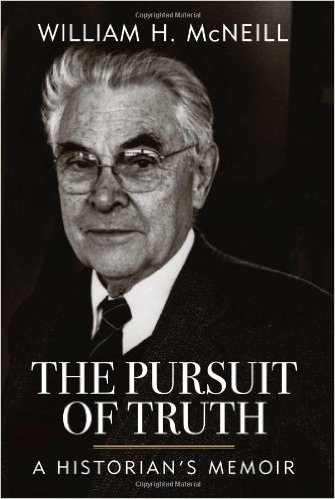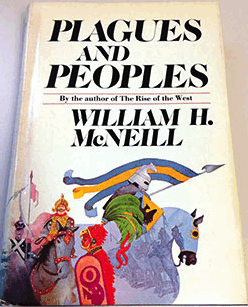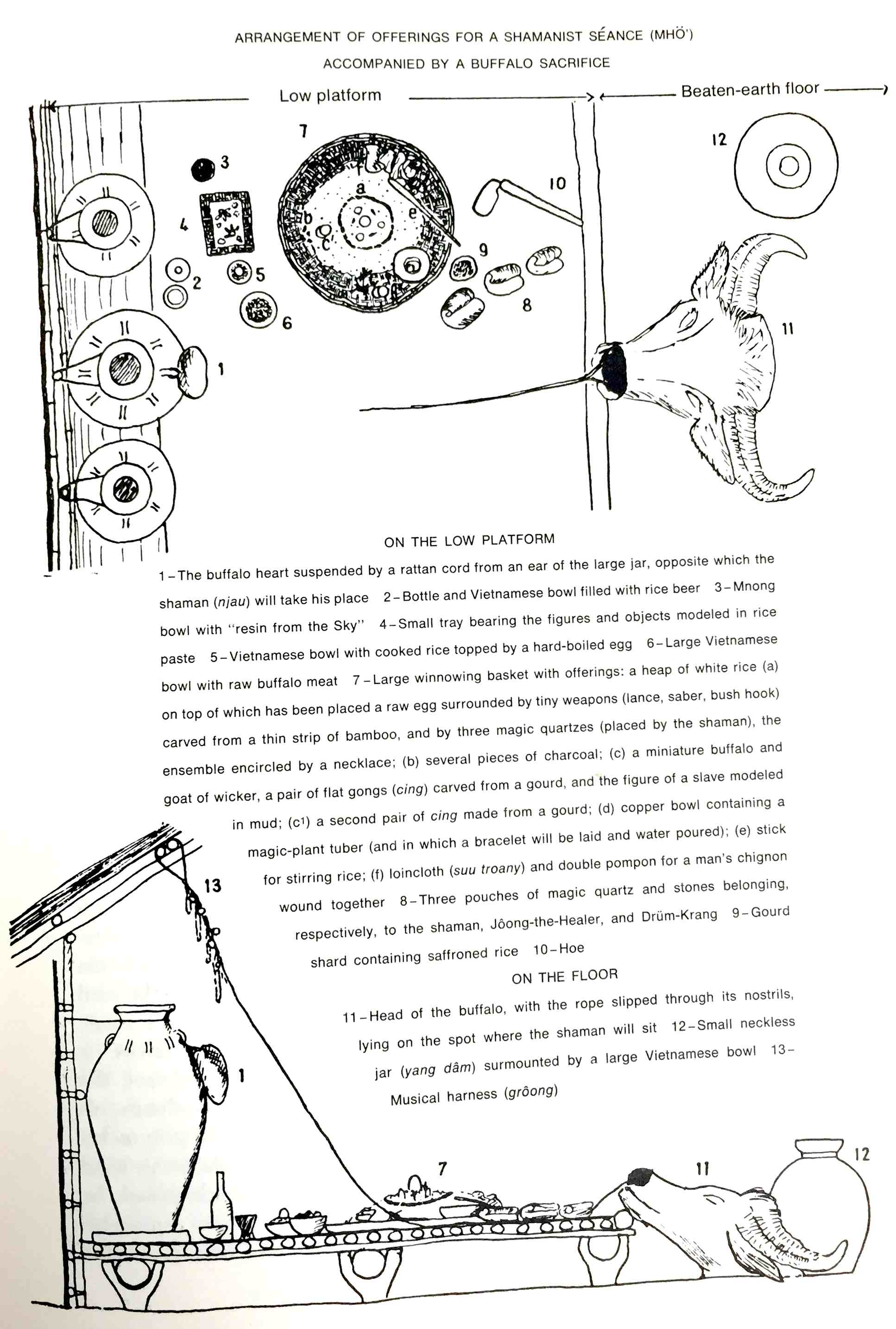


ウィリアム・ハーディ・マクニール
On William H. McNeill's "Plahues and Peoples,"(1976)



| William
Hardy McNeill (October 31, 1917 – July 8, 2016)[4] was an American
historian and author, noted for his argument that contact and exchange
among civilizations is what drives human history forward, first
postulated in The Rise of the West (1963). He was the Robert A.
Millikan Distinguished Service Professor Emeritus of History at the
University of Chicago, where he taught from 1947 until his retirement
in 1987.[5] |
ウィリアム・ハーディ・マクニール(William Hardy
McNeill、1917年10月31日 -
2016年7月8日)[4]は、アメリカの歴史家、作家であり、『西洋の台頭』(1963年)で初めて提唱した、文明間の接触と交流こそが人類の歴史を前
進させるという主張で知られる。1947年から1987年に定年退職するまで教鞭を執ったシカゴ大学のロバート・A・ミリカン名誉教授(歴史学)[5]。 |
| Early life and education William McNeill was born in Vancouver, British Columbia, Canada, the son of theologian and educator John T. McNeill, where he lived until age ten. The family then moved to Chicago, while spending summers on a family farm on Canada's Prince Edward Island.[6] He earned a Bachelor of Arts degree in 1938 from the University of Chicago, where he was editor of the student newspaper and "was inspired by the anthropologist Robert Redfield". He earned a Master of Arts degree in 1939, also at the University of Chicago, and wrote his thesis on Thucydides and Herodotus.[4] He began working towards a Ph.D. in history at Cornell University under Carl L. Becker. In 1941, he was drafted into the U.S. Army and served in World War II in the European theater.[7][8] After the war, he returned to Cornell for his Ph.D., which he earned in 1947.[5] |
生い立ちと教育 ウィリアム・マクニールは神学者で教育者のジョン・T・マクニールの息子としてカナダのブリティッシュコロンビア州バンクーバーに生まれ、10歳までそこ で過ごした。その後、一家はシカゴに移り住み、夏はカナダのプリンス・エドワード島の農場で過ごした[6]。 シカゴ大学では学生新聞の編集長を務め、「人類学者ロバート・レッドフィールドに影響を受けた」という。1939年に同じくシカゴ大学で文学修士号を取得 し、トゥキディデスとヘロドトスに関する論文を書いた[4]。1941年、彼はアメリカ陸軍に徴兵され、第二次世界大戦のヨーロッパ戦線に従軍した[7] [8]。戦後、彼は博士号を取得するためにコーネル大学に戻り、1947年に博士号を取得した[5]。 |
| Career Teaching In 1947, McNeill began teaching at the University of Chicago, where he remained throughout his teaching career. He chaired the university's Department of History from 1961 to 1967, establishing its international reputation. During his tenure as chair, he recruited Henry Moore to cast a bronze statue called Nuclear Energy commemorating the University of Chicago as the place where the world's first manmade nuclear chain reaction took place in 1942.[9] In 1988 he was a visiting professor at Williams College, where he taught a seminar on The Rise of the West.[10] He has stated that teaching "is the most wonderful way to learn things".[4] According to John W. Boyer, the University of Chicago's Dean and a former student of McNeill's, McNeill was "one of the most important historians to teach at the University of Chicago in the twentieth century". He retired from teaching in 1987 and moved to Colebrook, Connecticut.[6] Writing McNeill's best-known work is The Rise of the West: A History of the Human Community, which was published in 1963, relatively early in his career.[11] The book explored world history in terms of the effect different old world civilizations had on one another, and cites the deep influence of Western civilization on the rest of the world to argue that societal contact with foreign civilizations is the primary force in driving historical change. It had a major impact on historical theory by emphasizing cultural fusions, in contrast to Oswald Spengler's view of discrete, independent civilizations. Hugh Trevor-Roper wrote a glowing review in The New York Times Book Review.[4] McNeill's Rise of the West won the U.S. National Book Award in History and Biography in 1964.[12] From 1971 to 1980, he served as the editor of The Journal of Modern History. His Plagues and Peoples (1976), was an important early contribution to the study of the impact of disease on human history. In 1982, he published The Pursuit of Power, which examined the role of military forces, military technology, and war in human history.[13] In 1989 he published a biography of his mentor Arnold J. Toynbee.[14][1] In a 1992 review, he disagreed with Francis Fukuyama's argument in The End of History and the Last Man that the end of the Cold War meant that the American model of a capitalist liberal democracy had become the "final form of human government", as Fukuyama put it. In 1997 he disagreed with the central thesis of Jared Diamond's Guns, Germs, and Steel for overlooking the importance of human "cultural autonomy" in determining human development versus Diamond's focus on environmental factors.[15][16] In 2003, he coauthored The Human Web: A Bird's-eye View of World History with his son and fellow historian J. R. McNeill.[17][18] |
キャリア 教職 1947年、マクニールはシカゴ大学で教鞭を執り始め、教職に就くまで同大学に在籍した。1961年から1967年までシカゴ大学歴史学部の学部長を務 め、その国際的名声を確立した。学部長在任中、ヘンリー・ムーアを起用し、1942年に世界初の人工核連鎖反応が起こった場所としてシカゴ大学を記念する ブロンズ像『Nuclear Energy』を鋳造させた[9]。 1988年にはウィリアムズ・カレッジの客員教授を務め、『西洋の台頭』に関するセミナーで教鞭をとった[10]。彼は教えることは「物事を学ぶ最も素晴 らしい方法である」と述べている[4]。シカゴ大学の学部長であり、マクニールの元教え子であるジョン・W・ボイヤーによれば、マクニールは「20世紀に シカゴ大学で教鞭をとった最も重要な歴史家の一人」であった。1987年に教職を退き、コネチカット州コールブルックに移り住んだ[6]。 著作 マクニールの最も有名な著作は『The Rise of the West』である: 同書は、異なる旧世界文明が互いに及ぼした影響という観点から世界史を探求し、西洋文明が世界の他の地域に与えた深い影響を引き合いに出して、外国文明と の社会的接触が歴史的変化を促す主要な力であると主張している[11]。オズワルド・シュペングラーによる個別の独立した文明観とは対照的に、文化的融合 を強調し、歴史理論に大きな影響を与えた。ヒュー・トレヴァー=ローパーはニューヨーク・タイムズ紙のブックレビューで熱烈な批評を書いた[4]。マク ニールの『西洋の台頭』は1964年に全米図書賞の歴史・伝記部門を受賞した[12]。 1971年から1980年まで『現代史ジャーナル』の編集長を務める。疫病と民族(Plagues and Peoples)』(1976年)は、人類史における疫病の影響に関する研究への初期の重要な貢献である。1982年には、人類史における軍事力、軍事技 術、戦争の役割を考察したThe Pursuit of Powerを出版した[13]。1989年には、師であるアーノルド・J・トインビーの伝記を出版した[14][1]。 1992年の書評では、フランシス・フクヤマの『The End of History and the Last Man(歴史の終わりと最後の人間)』における、冷戦の終結はアメリカの資本主義的自由民主主義モデルがフクヤマの言うところの「人類の政府の最終形態」 になったことを意味するという議論に同意しなかった。1997年には、ジャレド・ダイアモンドの『銃・病原菌・鉄鋼』の中心的な論旨である、人類の発展を 決定する人間の「文化的自律性」の重要性を見落としていることに対し、ダイアモンドが環境要因に焦点を当てていることに異論を唱えた[15][16]: A Bird's-eye view of World History(世界史の鳥瞰図)』を息子であり歴史家仲間でもあるJ・R・マクニールと共著している[17][18]。 |
| Awards and honors In addition to being elected to the American Academy of Arts and Sciences and winning the U.S. National Book Award in History and Biography in 1964 for The Rise of the West, McNeill received several other awards and honors.[19][12] He was elected to the American Philosophical Society in 1977.[20] In 1985 he served as president of the American Historical Association.[6] In 1996, McNeill won the prestigious Erasmus Prize, which the Crown Prince of the Netherlands Willem-Alexander presented to him at Amsterdam's Royal Palace.[1] In 1999, Modern Library named The Rise of the West one of the 100 Best Nonfiction Books of the 20th century.[21] In 2009, he won the National Humanities Medal.[22] In February 2010, President Barack Obama, a former University of Chicago instructor himself, awarded McNeill the National Humanities Medal to recognize "his exceptional talent as a teacher and scholar at the University of Chicago and as an author of more than 20 books, including The Rise of the West: A History of the Human Community (1963), which traces civilizations through 5,000 years of recorded history".[23] Personal life In 1946 McNeill married Elizabeth Darbishire, whom he met during his military service during World War II as an assistant military attaché to the Greek and Yugoslavian governments-in-exile in Cairo.[4] She died in 2006.[24] McNeill himself died in July 2016 at the age of 98.[6] |
受賞と栄誉 アメリカ芸術科学アカデミーの会員に選出され、1964年に『The Rise of the West』で全米図書賞(歴史・伝記部門)を受賞したほか、マクニールはいくつかの賞を受賞している[19][12]。 [20]1985年にはアメリカ歴史学会の会長を務めた[6]。1996年には名誉あるエラスムス賞を受賞し、オランダ皇太子ウィレム=アレクサンダーか らアムステルダムの王宮で贈られた[1]。 1999年、モダン・ライブラリーは『西洋の勃興』を20世紀のベスト・ノンフィクション100冊に選出した[21]。 2010年2月、自身もシカゴ大学の元教官であるバラク・オバマ大統領は、「シカゴ大学の教師および学者として、また『西洋の勃興』を含む20冊以上の著 書の著者としての卓越した才能」を称え、マクニールに国家人文勲章を授与した[22]: 1963年の『A History of the Human Community(人類社会の歴史)』では、5000年にわたる記録された歴史を通して文明をたどっている」[23]。 私生活 1946年、マクニールは第二次世界大戦中にカイロに駐在していたギリシャ・ユーゴスラビア亡命政府の駐在武官補佐官として兵役中に知り合ったエリザベ ス・ダービシャーと結婚した[4]。 |
| Works (1947). The Greek Dilemma War And Aftermath. London: J. B. Lippincott Company. Retrieved February 12, 2020 – via Internet Archive. (1949). History of Western Civilization: A Handbook. Chicago: University of Chicago Press. 6th edition, 1986. ISBN 978-0-226-56159-2. (1953) "America, Britain and Russia, Their Co-operation and Conflict, 1941–1946, Oxford University Press, under the auspices of the Royal Institute of International Affairs, reprinted by Johnson Reprint Corporation, 1970[ISBN missing] (1954) Past and Future. Chicago: University of Chicago Press.[ISBN missing] "The Introduction of the Potato into Ireland," The Journal of Modern History Vol. 21, No. 3, September 1949 (1963). The Rise of the West: A History of the Human Community. Chicago: University of Chicago Press. Revised edition, 1991. ISBN 978-0-226-56141-7. (1964). Europe's Steppe Frontier: 1500–1800. Chicago: University of Chicago Press.[ISBN missing] (1973). "The Ecumene: Story of Humanity". Harper & Row. ISBN 0065520424 (1974). The Shape of European History. Oxford: Oxford University Press. ISBN 978-0-19-501807-3 (1974). Venice: The Hinge of Europe, 1081–1797. Chicag University of Chicago Press. ISBN 978-0-226-56149-3. (1976). Plagues and Peoples. Garden City, NY: Anchor Press/Doubleday. ISBN 978-0-385-12122-4. (1978). The Metamorphosis of Greece Since World War II . (University of Chicago Press)ISBN 978-0-226-56156-1. (1979). McNeill, W. H. (March 1979), "Historical Patterns of Migration (with comment & reply)", Current Anthropology, 20 (1): 95–102, doi:10.1086/202206, JSTOR 2741864, PMID 11630845 (1980). The Human Condition: An Ecological and Historical View. Princeton: Princeton University Press. ISBN 978-0-691-05317-2 (1982). The Pursuit of Power: Technology, Armed Force, and Society since A.D. 1000. Chicago: University of Chicago Press. ISBN 978-0-226-56157-8 (1984). "Command vs market: Across the centuries", In: Craig. E. Aronoff, John L. Ward, dir. "The Future of Private Enterprise", Vol 1, Atlanta: Georgia State University, pp81-94 (1989). Arnold J. Toynbee: A Life. Oxford: Oxford University Press. ISBN 978-0-19-506335-6 (1991). Hutchins' University. A Memoir of the University of Chicago. 1929–1950. Chicago: University of Chicago Press. ISBN 978-0-226-56170-7 (1992). The Global Condition: Conquerors, Catastrophes, & Community. Princeton: Princeton University Press.[ISBN missing] (1995). Keeping Together in Time: Dance and Drill in Human History. Cambridge: Harvard University Press.[ISBN missing] (1998). A World History. Oxford: Oxford University Press; 4th edition. (First published 1967).[5] ISBN 978-0-19-511616-8 (2003). The Human Web: A Bird's-Eye View of World History (with J. R. McNeill). New York: W. W. Norton. ISBN 978-0-393-92568-5 (2005). Berkshire Encyclopedia of World History (with Jerry H. Bentley, David Christian et al., editors). 5 volumes. Great Barrington, MA: Berkshire Publishing Group. ISBN 978-0-9743091-0-1. (2005). The Pursuit of Truth: A Historian's Memoir. Lexington: University Press of Kentucky.[ISBN missing] (2009). Summers Long Ago: On Grandfather's Farm and in Grandmother's Kitchen. Great Barrington, MA: Berkshire Publishing Group. ISBN 978-1-933782-71-3. (2011). Berkshire Encyclopedia of World History, 2nd Edition (with Jerry H. Bentley, David Christian et al., editors). 6 volumes. Great Barrington, MA: Berkshire Publishing Group. ISBN 978-1-933782-65-2. |
|
| https://en.wikipedia.org/wiki/William_H._McNeill_(historian) |
『疫病と世界史』【シノプシス】
この本は、ウィリアム・マクニール『疫病と世界史 (上) (下)』佐々木昭夫訳、(中公文庫)、中央公論新社、2007年の原著、Plagues and peoples / William H. McNeill, Garden City, N.Y. : Anchor Press , 1976です。
この資料をつかった授業のシラバス(2016年大阪大学大学院研究科共通科目:医療人類学「進化生物学からみた医療人類
学:2016」)
【文献資料】
| 序数 |
タイトル |
パスワード付き |
| 1 |
Introduction |
W-MaNeill_Plagues&People_1975-1.pdf |
| 2 |
I: Man the Hunter |
W-MaNeill_Plagues&People_1975-2.pdf |
| 3 |
II: Breakthrough
to History |
W-MaNeill_Plagues&People_1975-3.pdf |
| 4 |
III: Confluence of
the Civilized Disease Pools of Eurasia: 500 B.C. to A.D. 1200 |
W-MaNeill_Plagues&People_1975-4.pdf |
| 5 |
IV: The Impact of
the Mongol Empire on Shifting Disease Balances, 1200-1500 |
W-MaNeill_Plagues&People_1975-5.pdf |
| 6 |
V: Transoceanic
Exchanges, 1500-1700 |
W-MaNeill_Plagues&People_1975-6.pdf |
| 7 |
VI: The Ecological
Impact of Medical Science and Organization since 1700 |
W-MaNeill_Plagues&People_1975-7.pdf |
| 8 |
Appendix, Notes, Index | W-MaNeill_Plagues&People_1975-8.pdf |
【『銃・病原菌・鉄』章の構成】
【資料リンク】
【教科書】
【関連書】
【関連図版】
Black_death_14th.gif か図版クリックで拡大します(4倍程
度)
黒死病の流行1347年12月〜1350年6月(文
庫版、下巻4章、33ページ以降を参照)
【その他】
オフィスアワーはありません。開講日の前後の時
間で対応します。要予約:![tiocaima7n[at]me.com](gifadres.gif) あるいは、rosaldo[at]
cscd.osaka-u.ac.jp
あるいは、rosaldo[at]
cscd.osaka-u.ac.jp
【予備】

(c) Mitzub'ixi Quq Chi'j. Copyright, 2014-2015